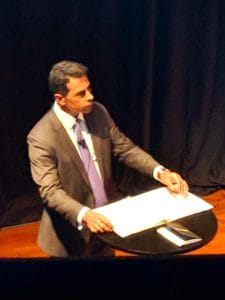
America’s federal financial crimes enforcement agency, FinCEN, has noticed “a gap” in the reporting of illicit use of cryptocurrencies at casinos and card clubs in recent years, the agency’s director told attendees at the 12th Annual Las Vegas Anti-Money Laundering Conference this week.
Director Kenneth A. Blanco also added that he is “concern(ed)…to hear about some compliance budgets being cut by casinos looking to trim costs and retain gamblers.”
He called proper financial monitoring in the US a matter of national security and said SARs (suspicious activity reports) figured into nearly 60% of FBI investigations and roughly 20% of anti-terrorism investigations.
Blanco said SAR (suspicious activity report) filings by casinos and card clubs have nonetheless been declining across the US for the past two years:
“We saw… a decrease of more than 9 percent in SARs filed between 2017 and 2018…From 2017 to 2018, the top five SAR filings by state were Nevada, Louisiana, California, New Jersey, and Pennsylvania. While New Jersey experienced a 10% increase, possibly tied to Sports Betting, Nevada (-7%), Louisiana (-15%), and Pennsylvania (-15%) all experienced declines in overall filings, which is symptomatic of the decline in overall industry filings. Other large decreases came from Oklahoma (-51%), Washington (-46%), and Ohio (-45%).”
Cryptocurrencies are often used for online gambling, and there is much overlap between the crypto and gambling worlds. Virtual currencies can flow into casinos through online/mobile apps or at brick-and-mortar establishments.
Blanco said reporting of suspicious use of cryptocurrencies, in particular, needs to be more ‘robust’:
“While FinCEN has received some filings from casinos regarding cyber-enabled crimes, (virtual currency)-related SAR filings by casinos have not been as robust as expected since the May CVC guidance and advisory were published…Casinos should be filing SARs when they encounter suspicious CVC activity…”
He advised casinos to review guidance and advisory information regarding the processing of virtual currency transactions by FinCEN regulated industries, adding:
“FinCEN expects that your casino or card club is monitoring your sports betting programs for potentially suspicious activity. This includes offering sports betting through a mobile app.”
Monitoring of must be comprehensive and can be very technical when it involves cryptocurrencies said Blanco:
“You must establish and implement procedures for using all available information to detect and report suspicious transactions…(Y)ou need to ensure that this is accounted for in your policies, procedures, …internal controls… (and) risk assessments. You should also consider how you will review and conduct due diligence on transactions in (virtual currency). How will you conduct blockchain analytics to determine the source of the (virtual currency)? How will you incorporate (virtual currency)-related indicators into your SAR filings as appropriate?”
On-site compliance officers are expected to be intimately familiar with FinCEN requirements, he added:
“The advisory highlights prominent typologies, associated ‘red flags,’ and identifies information that would be most valuable to law enforcement if contained in suspicious activity reports…FinCEN issued FAQs in 2016 to assist financial institutions in reporting such cyber indicators and cyber-enabled financial crime…available on our website. This is an area you can expect your examiners to ask about.”
Blanco noted that, “Minimal Gaming with Large Transactions is the highest reported activity with more than 5,000 SARs reflecting this activity…(and that) Reports of Chip Walking have dramatically increased since this was added to the SAR form in the summer of 2018. Chip Walking is now the second most selected suspicious activity on the SAR form, with more than 4,400 reports being cited this year to date.”
Chip-walking is the process of buying volumes of gambling chips at a casino and then using them to pay employees working in an underground business such as a drug lab or marijuana operation.
 Blanco said that information collected by casinos to protect their interests can be fed onto SAR filings, which in turn can be legally distributed to parent companies and affiliates within the US to reduce risk throughout the business.
Blanco said that information collected by casinos to protect their interests can be fed onto SAR filings, which in turn can be legally distributed to parent companies and affiliates within the US to reduce risk throughout the business.
“We know the kind of significant information that casinos are able to develop on gaming customers. This information is extraordinary and relevant, and is already used by casinos for a variety of marketing and other business purposes…This information can and should be used by your compliance personnel as they monitor customers for suspicious activity.”
The FinCEN director encouraged casinos to ensure that various departments: legal, compliance and IT, for instance, are sharing information and working in tandem to enhance compliance and risk management:
“Information developed by your security departments for combating and preventing fraud should also be shared with compliance personnel. The legal department should also alert the compliance department when a subpoena is received. A subpoena could trigger reviews of customer risk ratings and account activity.”
Blanco also said that quietude in enforcement doesn’t mean none is underway or pending:
“There is a misconception that just because FinCEN has not publicly issued an enforcement action against a casino or card club since last year that FinCEN is not looking at this financial sector. Let me assure you, this is not the case. FinCEN is continually looking at compliance across all financial institutions and will not hesitate to act when it identifies financial institutions that violate the BSA. It is also important to note that not all enforcement actions are public.”
Blanco ended by saying that casinos are legally obligated to assure the integrity of their monitoring and reporting systems:
“Remember that this is not just a best practice, but a requirement under the AML program rule for casinos and card clubs…To be clear—we take the culture of compliance seriously. This is a national security issue: not something to be taken lightly—and we will not take it lightly.”
He said, “BSA data also aids investigations tied to bulk cash smuggling, gang activity, significant fraud, transnational organized crime, bribery, health care fraud, corruption, embezzlement, kleptocracy, and third-party money laundering, among other crimes.”
He also noted that casinos and card clubs have a role in determining beneficial ownership information about potential shell companies:
“Its importance to our national security cannot be (over)stated…Criminals of all kinds, including terrorists, establish domestic shell companies to mask and further their criminal activity, to invest and buy assets with illicit proceeds, and to prevent law enforcement and others from efficiently and effectively investigating tips or leads, thus allowing these bad actors to hide from justice and continue their bad acts.”

